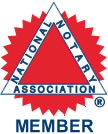Professional, Mobile, Fast – Action Notary Services
Office Phone: 408.710-3963
Email: j_sheets@charter.net
Frequently Asked Questions
1) What is a Notary Public?
A responsible person appointed by state government to witness the signing of important documents and administer oaths.
2) Why are documents notarized?
To deter fraud. An impartial witness (the Notary) ensures that the signers of documents are who they say they are and not imposters. The Notary makes sure that signers have entered into agreements knowingly and willingly.
3) May any document be notarized?
For a document to be notarized, it must contain: 1) text committing the signer in some way, 2) an original signature (not a photocopy) of the document signer, 3) a notarial “certificate” which may appear on the document itself or on all attachment. The Notary fills in the certificate, signs it, then applies his or her seal to complete the notarization.
4) Is notarization required by law?
For many documents, yes. Certain affidavits, real estate deeds and other documents may not be legally binding unless they are properly notari
zed.
5) How does a Notary identify a signer?
Generally, the Notary will ask to see a current identification document that has a photograph, physical description and a signature. A driver’s license, military ID or passport will usually be acceptable.
6) How much does a notarization cost?
Fees vary – as much as $10.00 in some states and as little as 50 cents in others – according to state law.
7) Does notarization mean that a document is “true” or “legal”?
No. Notaries are not responsible for the accuracy or legality of documents they notarize. Notaries certify the identity of signers. The signers are responsible for the content of the documents.
8) May a Notary give legal advice or draft legal documents?
Absolutely not. A Notary is forbidden from preparing legal documents for others or acting as a legal advisor unless he or she is also an attorney. Violators can be fined or jailed for the unauthorized practice of law.
9) May a Notary notarize or prepare immigration papers?
Only a few immigration forms need to be notarized, such as the Affidavit of Support (1-134), but U.S. Immigration and Naturalization Service (INS) regulations state that no one may prepare or file another person’s immigration papers unless he or she is an attorney or a U.S. Justice Department-approved “accredited representative.” Non attorneys can provide clerical, secretarial or translation assistance with INS forms, as long as no advice is given. However, courts have held that even the selection of which forms to complete can constitute the practice of law, since the filing of INS forms creates legal consequences having a substantial impact on the applicant.
10) May a Notary refuse to serve people?
Only if the Notary is uncertain of a signer’s identity, willingness or general competence, or has a good reason to suspect fraud. Notaries should not refuse to serve anyone because of race, religion, nationality, lifestyle, or because the person is not a client or customer. Discrimination on any basis is not a suitable policy for a public official.
11) Where do I report illegal or improper acts by a Notary?
Any wrongdoing or illegal activity should be reported to the police or appropriate state Notary-regulating office (secretary of state, governor, lieutenant governor or attorney general). Or you may write the National Notary Association’s NOTARY-CONSUMER WATCH, a program to assist consumers in reporting improper practices by unscrupulous or uninformed Notaries. NOTARY-CONSUMER WATCH does not investigate crimes nor give legal advice; it is a public service program directing consumers victimized by a Notary’s actions to the appropriate agency.
